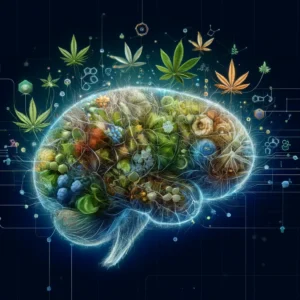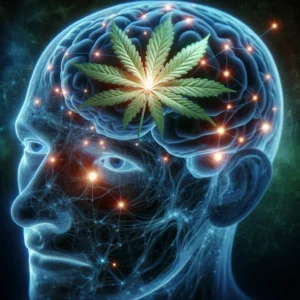 Whether you’re a seasoned consumer or just beginning to explore cannabis benefits, you’ve likely pondered: How does marijuana influence the brain? As an author and advocate for all things cannabis, including understanding cannabis brain effects, I’m eager to share the latest research and insights. Cannabis has been used for medicinal, spiritual, and recreational purposes for millennia, but only recent scientific advances have begun to demystify its impact on our complex brain. So, grab your favorite strain and prepare to dive into how cannabis affects this intricate organ.
Whether you’re a seasoned consumer or just beginning to explore cannabis benefits, you’ve likely pondered: How does marijuana influence the brain? As an author and advocate for all things cannabis, including understanding cannabis brain effects, I’m eager to share the latest research and insights. Cannabis has been used for medicinal, spiritual, and recreational purposes for millennia, but only recent scientific advances have begun to demystify its impact on our complex brain. So, grab your favorite strain and prepare to dive into how cannabis affects this intricate organ.
Introduction to the topic of cannabis and its effects on the brain
Ah, cannabis – the sweet smells and distinct flavors it brings with it. But let’s not forget what it can do to our brains. As a cannabis author, I’m here to give you an introduction to the topic. While many people may think of marijuana as a harmless recreational substance, there are actually significant and long-lasting effects it can have on our brains. THC, the main psychoactive component in cannabis, can interfere with the normal functioning of our brain cells and alter the way we think and feel. Whether you’re a regular user or simply curious about its effects, it’s important to understand how cannabis affects the brain. So let’s dive in and explore the fascinating world of marijuana and the brain!
Brief overview of the chemical compounds in cannabis and how they interact with the brain’s receptors
Cannabis is a plant that has been utilized for both medicinal and recreational purposes for centuries. What makes cannabis so intriguing is the plethora of chemical compounds it contains, which interact with the brain’s receptors in unique ways. The most famous compounds, THC and CBD, are well-known for their psychoactive and pain-relieving effects, respectively. But there are over 100 other cannabinoids, terpenoids, and flavonoids that also contribute to the plant’s medicinal and therapeutic properties. These compounds interact with the body’s endocannabinoid system (ECS) to produce a range of effects, from reducing inflammation and anxiety to inducing feelings of euphoria and relaxation. In understanding the complex and fascinating relationship between cannabis compounds and the ECS, we uncover a plant that has the potential to aid in the treatment of a wide range of conditions, from chronic pain to PTSD.
Discussion on how THC, the psychoactive compound in cannabis, affects brain functions such as memory, perception, and movement
 For decades, the medicinal and recreational use of cannabis has been the subject of numerous debates. While some argue that the psychoactive compound in cannabis, THC, can lead to negative effects on brain function, others believe that it can be beneficial in treating various medical conditions such as chronic pain and anxiety disorders. As a cannabis author, it’s important to examine both sides of the argument when discussing how THC affects brain functions like memory, perception, and movement. While it’s true that THC can impair short-term memory and negatively impact motor skills, it can also enhance sensory perception and contribute to a feeling of relaxation. Overall, the effects of THC on the brain largely depend on the individual and the potency of the cannabis product being consumed. As the debate over the use of cannabis continues, further research and education are crucial to understanding the potential benefits and risks of this complex plant.
For decades, the medicinal and recreational use of cannabis has been the subject of numerous debates. While some argue that the psychoactive compound in cannabis, THC, can lead to negative effects on brain function, others believe that it can be beneficial in treating various medical conditions such as chronic pain and anxiety disorders. As a cannabis author, it’s important to examine both sides of the argument when discussing how THC affects brain functions like memory, perception, and movement. While it’s true that THC can impair short-term memory and negatively impact motor skills, it can also enhance sensory perception and contribute to a feeling of relaxation. Overall, the effects of THC on the brain largely depend on the individual and the potency of the cannabis product being consumed. As the debate over the use of cannabis continues, further research and education are crucial to understanding the potential benefits and risks of this complex plant.
Explanation of CBD and its potential neuroprotective effects on the brain
As cannabis becomes less stigmatized and more widely accepted for its medicinal properties, one component in particular is generating a lot of buzz: CBD. Short for cannabidiol, this non-psychoactive compound in marijuana has shown promise in treating a range of conditions, from anxiety to epilepsy. But what about its potential neuroprotective effects on the brain? While research is still in its early stages, there is evidence to suggest that CBD may be able to help protect the brain from damage caused by injury or disease. It’s an exciting area of study that could have important implications for treating conditions like Alzheimer’s and Parkinson’s in the future. So while the jury is still out on just how effective CBD can be, there’s no denying that it’s an area of cannabis research worth watching.
Research findings on how long-term cannabis use can impact brain structure and function
As a cannabis author, I have spent countless hours poring over research studies on the effects of long-term cannabis use. What I have found is both fascinating and concerning. Studies have shown that prolonged cannabis use can lead to changes in brain structure and function, particularly in areas responsible for memory and learning. These changes can affect memory consolidation and retrieval, making it harder for individuals to retain and recall large amounts of information. Additionally, the effects on brain function can impact cognitive processing speed, making it difficult to complete complex tasks efficiently. While the impact of cannabis on the brain remains a hotly debated topic, these findings highlight the importance of approaching cannabis use with caution and seeking medical guidance.
Factors that can influence individual reactions to cannabis, including genetics, dosage, and frequency of use
Cannabis is a plant that has been used for thousands of years for medicinal and recreational purposes. However, it’s essential to understand that its effects can vary from person to person. Several factors can influence individual reactions to cannabis, including genetics, dosage, and frequency of use. Genetics play a critical role in how our bodies react to cannabis. Some people have a genetic predisposition for specific outcomes, such as feeling anxious or paranoid. Dosage is also a significant factor; taking too much can lead to negative side effects, while not taking enough can result in no effects at all. Frequency of use can also cause changes in how we react to cannabis over time. Whether you’re a seasoned veteran or a newcomer, understanding these factors is crucial to ensure a positive experience with this incredible plant.
Effects of cannabis on specific mental health conditions such as anxiety and depression
Cannabis legalization, for the most part, has been largely welcomed across the globe. With recent studies showing that the plant has helped alleviate both physical and mental challenges, largely in areas that traditional pharmaceuticals have failed, more people are beginning to advocate for the legalization of the plant. Anxiety and depression, which are common mental health disorders, currently affect millions of people worldwide, and are poised to become even more widespread. The good news is, more and more people are beginning to use cannabis as a way to manage their symptoms, with most of them reporting overwhelmingly positive results. While the research is still ongoing and more in-depth studies are necessary, the initial results so far have been remarkable, bolstering the hopes of patients and medical professionals alike.
Addressing common misconceptions about cannabis and its impact on brain development in adolescents
As a cannabis author, I’ve encounter endless myths about this controversial plant – and perhaps the most pervasive is the notion that using it will irreparably damage the brain of young teens. However, the truth is more nuanced than that. While it’s true that cannabis can impact cognitive development in some cases, it’s not the all-encompassing danger that many believe it to be. Understanding the facts and myths surrounding cannabis use in adolescents is the first step towards creating an accurate, evidence-based conversation around this complex topic. So let’s dive into the research, separate the hype from reality, and have a candid conversation about cannabis and its impact on developing brains.
Potential benefits of using cannabis for medicinal purposes in treating neurological disorders such as epilepsy or multiple sclerosis
As a cannabis author, I’ve spent countless hours researching the potential benefits of using cannabis for medicinal purposes, and I’m excited to say that the results are promising. For individuals suffering from neurological disorders, such as epilepsy or multiple sclerosis, cannabis has been shown to provide relief from symptoms such as seizures, muscle spasms, and chronic pain. This is thanks to the plant’s ability to interact with the body’s endocannabinoid system, which plays a crucial role in regulating various bodily functions. While further research is still needed to fully understand the extent of cannabis’ potential in treating neurological disorders, the findings thus far are encouraging and offer hope for those seeking alternative forms of treatment.
Highlighting the need for more research to fully understand the effects of cannabis on the brain.
As we learn more about cannabis and its effects on our cognitive abilities, it’s becoming increasingly clear that further research is needed in order to fully understand the scope of its impact on the brain. While some studies have shown that cannabis can have positive effects on conditions like anxiety and chronic pain, others have suggested that long-term use can lead to decreased cognitive function and even brain damage. As we continue to legalize and regulate cannabis use around the world, it’s essential that we invest in comprehensive research to better understand the complexities of this powerful plant and the ways it interacts with our bodies and minds. By taking a more nuanced approach to cannabis research, we can ensure that we’re making informed decisions about how to use this substance safely and effectively.
Note: It is important to mention that this post is for informational purposes only and does not promote or condone the use of cannabis without proper medical supervision or legal permission according to state/country laws.
As a cannabis author, it is imperative that I stress the importance of responsible and legal use of cannabis. While it has its benefits, the use of this plant should not be taken lightly. It is crucial that individuals seek proper medical supervision and adhere to state/country laws before consuming cannabis. As an informative source, this post aims to provide readers with knowledge about the effects and benefits of cannabis. However, it is not our intention to promote or condone the use of cannabis without proper precautions. By providing reliable and factual information, we hope to guide individuals towards making informed decisions about their personal health and wellness.
As we come to the end of this informative journey, it is clear that cannabis is a complex and fascinating substance that can significantly affect our brains. From its chemical compounds and how they interact with receptors to its potential neuroprotective effects, we have learned that cannabis has the power to alter our brain functions in both positive and negative ways. However, it is important to remember that every individual’s reaction to cannabis may vary due to factors such as genetics, dosage, and frequency of use. We have also explored the controversial topic of using cannabis for medicinal purposes and debunked some myths surrounding its impact on brain development in adolescents. But ultimately, one thing is certain – more research is needed to fully understand the effects of cannabis on our brains. So let us continue delving deeper into this subject with an open mind and willingness to learn. Till then, stay informed and make responsible decisions regarding its usage. As always, thank you for joining me on this journey!









